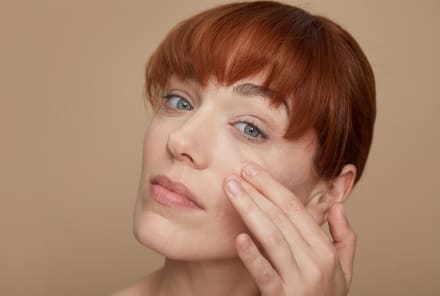Advertisement
Why Is My Skin Starting To Sag? 3 Common Causes & What To Do


An integrative approach to skin longevity includes seeking out the cause of your skin concerns rather than immediately jumping to treatment. This goes for dark spots, acne, redness, and yes, even signs of skin aging like sagging.
Knowing the why behind newly droopy skin can help you craft an effective treatment plan and give you some peace of mind that, while it may not seem like it at times with Photoshop and the Botox boom, skin aging is completely normal.
Below, three of the most common causes of sagging skin and how to support your skin's longevity, inside and out:
UV exposure
Collagen and elastin are your skin's structural proteins that keep it firm—so when those two things are hindered, skin sagging is expected.
Unfortunately for sunbathing lovers, ultraviolet radiation has the ability to penetrate the epidermis where it damages the skin cells, proteins, and elastic fibers that keep skin firm—directly contributing to skin aging.
In fact, 80% of signs of visible skin aging1—like wrinkles, fine lines, and dark spots—can be attributed to sun damage. So, even if sagging isn't your main concern, UV exposure is to blame for plenty of the accelerated skin aging you may spot.
What to do
Lifestyle factors like sleep & stress
If you've ruled out UV exposure (say you're an SPF addict or you skip extended time in the sun), then you may next look to lifestyle factors. Cornerstones of overall well-being generally affect your skin as well—we'll use sleep and stress as examples.
There's a ton of science behind your skin's connection to these factors, so we'll keep it to the point, starting with sleep.
While you sleep, your skin kicks into repair mode, thanks to a little hormone called melatonin (often referred to as the "sleepy-time" hormone).
"Melatonin is critically important for your skin and plays a significant role in skin repair from environmental exposure, UV light, stressors, pollution, and so on," says board-certified dermatologist Keira Barr, M.D., on an episode of Clean Beauty School. "If you're not resting, you're not generating that melatonin, and your skin isn't repairing itself."
Next, we have stress. Research has confirmed that your skin acts as an immediate stress perceiver and a target of the stress response2.
Simply put, psychological stress tells the brain and the skin to signal the release of hormones that can trigger inflammation, impair wound healing, accelerate aging, and worsen skin conditions, including acne, eczema, and psoriasis.
Learn more: You can read more about the fascinating link between stress and skin here if you're curious.
What to do
Age-related skin sagging
I'm going to be very honest: You can use the most expensive skin care in the world, get all of the treatments you want, and live a stress-free, well-nourished lifestyle and still get fine lines, wrinkles, and skin sagging—and that's normal.
While it's never a bad idea to work in some self-care and tend to your skin daily (it is your largest organ, after all), there's a lot going on under the surface that is only controlled by time. If you're lucky enough to have more time on this earth, then your skin will naturally begin to show it.
In fact, your collagen production begins to dip in the mid-20s, and that loss continues at a rate of about 1% each year3 thereafter. For women, hitting menopause triggers a more significant drop, around 30%4.
In addition, your hyaluronic acid bank also begins to deplete, which explains why aging skin tends to be drier. These factors together contribute to skin sagging over time.
What to do
The takeaway
Understanding what contributes to signs of accelerated skin aging, like sagging, can help you build an effective strategy for maintaining your skin's health and firmness. A few factors you can have some control over include sun exposure, sleep quality, and stress levels.
While you can't stop the skin aging clock completely, you can support your skin's collagen and hyaluronic acid levels through high-quality supplements.
If you want to dive deeper into the science of collagen and how it plays a role in your skin's structure, check out this guide.











